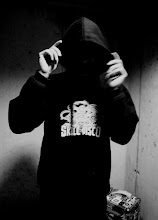The great Amsterdam-based imprint Makkum Records is back on the circuit with another highly thrilling take on African music, especially of the music hailing from the North East regions of Ghana. This music, named Kologo after the two string instrument it's based on, was introduced to us via Prince Buju's fascinating album
"We Are In The War" also released via Makkum Records, about a year ago and hasn't lost any of its inherent fascination ever since. With this highly recommendable compilation album which has been released on April 10th, 2k16 we see Makkum-mastermind Arnold De Boer document a fraction of the thriving Kologo scene of Bolgatanga, the capital of the countries North Eastern area, through a collection of ten tracks created, written and played by the likes of Ayuune Sule, Atimbili, Prince Buju, Asaa Naho, King Ayisoba - the only artist featured three times on here with the albums opening and closing song as well as a feature appearance - and many more which enable the listener to really distinguish how differently each individual artist approaches Kologo stylewise, putting his personal stamp on and interpretation to the music although they're starting from the same point, a plain dogma for this album that turns out to be sth. like 100% pure traditionalism with no computer-generated beats involved. But still, the outcome is varied - King Ayisoba's "Africa" is living by lively drums as well as call and response chants, Ayuune Sule "Who Knows Tomorrow" brings rhythmic, fast-paced Kologo play and a powerful, emotional voice whilst Prince Buju's "Afashee", taken from his 2015-released album, is introducing a raw, angry and feverish vibe. With Atimbila's "I Have Something To Say" we see a little uplifting, kinda caribbean vibe taking over leaning somewhat towards summery Pop and a bit of cheesiness, Atamina feat. King Ayisoba and their "African Problems" come across as a conscious, yet political tune addressing common knowledge in a subtle way before Amoru uses the instrument in a very sparse, partly even experimental way in "Yabaa" and might represent the leftfield, but not less intense spectrum of what this Ghanaan music is able to deliver in terms of diversity. With Barnasko's "Nsoh Yaaba" we meet a cliche of what many westerners might probably expect to be the music of African herdsmen as this tune feels like the sun's going down over a vast and wide savannah, Asaa Naho's "Home Witches" rely on call and response again before King Ayisoba's "Nerba" gets down to get dancefloors going for a reason. This is great stuff!
Album artwork on Instagram!

